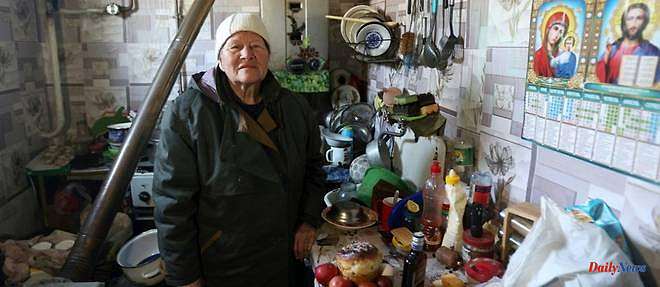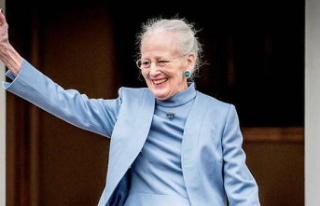Lioudmila Gaïdaï attended the Orthodox Easter celebrations last year with her children. This year, Russian forces shelled his town of Chassiv Iar in eastern Ukraine so heavily that the church closed and everyone fled.
In her dark, cluttered kitchen, whose blast-blown windows are covered with plastic sheeting, the 80-year-old woman nevertheless placed a traditional Easter cupcake on the table.
"I would like everything to stop and we can have a real Easter. To end all this, all these explosions, this war," Lioudmila said as tears welled up in her eyes.
“Only God knows when that will happen,” she adds, her words punctuated by the sound of both Russian and Ukrainian artillery fire.
Easter celebrations, the most important Christian holiday that commemorates the resurrection of Christ, take place on Sunday according to the Orthodox calendar, after a year marked by the Russian invasion of Ukraine.
In Sloviansk, a town in the same region, Ukrainian soldiers place wicker baskets containing traditionally decorated eggs and food in front of a small church.
Rescuers continue to clear the rubble to find civilians buried after a Russian missile hit an apartment building on Friday, killing at least 12 people.
Air-raid sirens sound as about 20 uniformed men and women gather in a row, a priest sprinkling them with holy water and elderly women singing religious hymns behind him.
"The shelling was so intense that the candle fell from my hands. We picked it up and continued to pray," says Father Mykola, referring to the attack two days earlier.
"If this had happened last year, we would probably have hidden in a shelter," he adds, pointing to a certain fatalism of the inhabitants of the eastern region of Donetsk in the face of the fighting.
President Volodymyr Zelensky congratulated the Ukrainian Orthodox, wishing them "unshakable faith in our victory". But some Ukrainian soldiers from Sloviansk met by AFP confide that the reality and the brutality of the war have shaken them spiritually.
"I tried," says Natalia Melnyk, answering the question of whether she believed in God. "My service to God and my military service are separate. I believe in man," adds the 40-year-old woman from the center of the country, who has served in the Ukrainian army for five years.
Russia's invasion of Ukraine left tens of thousands dead and injured, displaced millions and devastated towns and villages.
The Religious Freedom Institute, an NGO, recently estimated that nearly 500 religious buildings were damaged during the hostilities.
Authorities have advised residents of Donetsk to avoid cemeteries this year, to give clearance teams time to check them.
On a hill, the hamlet of Bogorodychné is dominated by what remains of the local monastery. One of its cupolas collapsed, a wall was gutted by a missile and the others bear the impacts of shrapnel.
Evgueni is one of the only inhabitants to have returned to this village, where the only sounds now are the chirping of birds and the barking of stray dogs.
He tells how the lavra and the neighboring buildings were destroyed last May: he was taking refuge in his basement when the strike took place. The explosion even threw him backwards several meters.
"We went out and there was smoke coming from the bricks and concrete. It was scary, of course. Early the next day, we left the village. We walked through the forest to the nearby monastery," says this 37 year old male.
"Every year, when there was peace, we used to celebrate Easter there. Of course, we can't go there now," he adds, nodding at the destroyed remains of the church behind his garden. .
"We can't afford to go to Sloviansk. There's shelling there. It's better to stay at home," he adds.
16/04/2023 17:39:43 - Tchassiv Iar (Ukraine) (AFP) - © 2023 AFP












